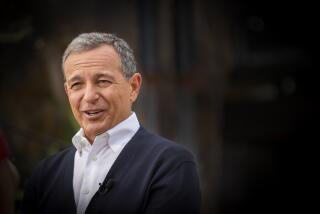Goizueta Dies; Led Coca-Cola to Dominance
- Share via
ATLANTA — Roberto C. Goizueta, an aristocratic and unpretentious Cuban immigrant whose 16-year leadership of Coca-Cola Co. transformed the once-floundering soda maker into one of the world’s richest corporate franchises--and made himself a billionaire in the process--died Saturday of complications related to lung cancer. He was 65.
Goizueta, a heavy smoker, died less than two months after doctors found a malignant tumor on his right lung. The hard-driving executive had worked through an initial two-week hospital stay in September, even having fax machines and a stock terminal installed in his hospital room, and the rapid deterioration in his health in the past week shocked colleagues at the Atlanta-based soft-drink manufacturer.
A cancer-treatment regimen of radiation and chemotherapy had weakened Goizueta’s immune system and left him defenseless against a bacterial throat infection that put him back in Atlanta’s Emory University Hospital on Oct. 7.
“Every one of the nearly 1 million members of the extended Coca-Cola family around the world feels the greatest sense of loss today,” Coca-Cola President and Chief Operating Officer M. Douglas Ivester said.
Billionaire investor Warren Buffett, a Coca-Cola shareholder and director, called Goizueta a “great leader and great gentleman.”
Goizueta’s achievements at Coca-Cola are hard to overstate, as is the way he exploited the public’s thirst for what is essentially sugared water to create a global corporate powerhouse that wields perhaps the most familiar trademark on the planet.
Although Goizueta never officially anointed a successor, the heir apparent is Ivester, 50, who is considered to be every bit as tough and aggressive as was Goizueta. The executive’s death isn’t expected to hurt the company, which has a deep management bench in addition to Goizueta protege Ivester, analysts said.
An obscure executive when he took Coke’s helm in 1981, Goizueta (pronounced Goy-SWET-ah) so expanded Coca-Cola’s presence around the globe that today 80% of the company’s profits come from abroad. Simultaneously, Coca-Cola’s annual sales more than tripled during his tenure, from $5 billion to $18.5 billion.
Coke’s overall value in the stock market soared an astonishing 34 times over, from $4.3 billion to $150 billion.
“The most important point to make about Goizueta is the sheer amount of wealth that he created,” said Frederick Allen, author of “Secret Formula: How Brilliant Marketing and Relentless Salesmanship Made Coca-Cola the Best-Known Product in the World.”
“It’s just sugar and water, and yet it’s got a higher stock value than the oil companies [and] the automobile manufacturers,” Allen said.
A $1,000 investment in Coke when Goizueta took over in 1981 would be worth roughly $63,000 today, assuming the stock’s dividends had been reinvested during that period. That’s why Goizueta, who built his wealth with Coca-Cola stock, died with a net worth that Forbes magazine estimated at $1.3 billion--making him the richest Latino in the nation.
Indeed, Goizueta was the first U.S. Latino to flirt with billionaire status, and he was a model for Latinos struggling to climb the corporate ladder.
“Roberto Goizueta had always been more than a role model,” said Hector Cantu, managing editor of Hispanic Business magazine in Santa Barbara. “He was one of the most respected and admired chief executives in the United States.”
What makes Goizueta’s record even more impressive is the way that he and Coke overcame the disastrous introduction of “New Coke” in the mid-1980s that created a public relations nightmare and threatened to tarnish Coke’s impeccable brand name. And this was despite the fact that before becoming chief executive, Goizueta had never sold a can of Coke or any other soda and had no marketing experience at all.
Roberto Crispulo Goizueta, born in Havana in 1931 to a wealthy sugar plantation owner, was educated in the United States (including a chemical engineering degree from Yale University) before returning to Havana, where he joined Coca-Cola in 1954 as a chemist.
In 1960, Goizueta left that behind to flee Fidel Castro’s regime. Goizueta took his young family on a trip to Miami and never returned to Cuba, even though he was nearly broke.
It is said that Goizueta had only $40 in his pockets and 100 shares of Coca-Cola stock, which he never sold.
Goizueta gradually climbed through Coke’s technical ranks and eventually became an executive vice president. In late 1979, he was one of six vice chairmen the company appointed with the expectation that one would later be chosen to become Coke’s chairman and chief executive.
Goizueta was considered the long shot of the group, in no small part because he lacked marketing experience. (However, because of his leadership of Coca-Cola’s laboratory, he had been among the handful of insiders that knew the company’s “secret formula.”)
But Goizueta--who was often described as seeming to be either shy or enigmatic at first meeting but who actually had a competitive, risk-taking spirit--did two things that helped him emerge from the pack and become Coke’s chief.
First, he became close to Coca-Cola’s longtime leader, Robert Woodruff, who had long since retired by the early 1980s but remained a commanding presence around Coke’s headquarters. (Woodruff died in March 1985 at age 95.)
Also, Goizueta, after being named Coke’s president in 1980, said his goals included finding ways to raise the price of Coca-Cola’s then-flagging stock, and that appealed to the company’s major owners, which included dozens of Georgia families that had made millions from owning Coke shares.
With Woodruff’s endorsement, Goizueta was elected chairman and chief executive in 1981, and he then turned once-conservative Coca-Cola on its ear.
Whereas the company had always avoided debt, Goizueta’s Coke borrowed billions of dollars, in good part to buy up independent bottling operations around the world and then endow them with upgraded equipment. He unloaded Coke’s non-soda businesses.
In 1982, he also veered from Coca-Cola’s practice of eschewing new versions of Coke drinks and introduced Diet Coke, which became a huge success.
That same year, he took a step outside of beverages and bought the Columbia Pictures studio. Judged by the financial returns on its films, Columbia was a disappointment (among its bombs was “Ishtar”). Yet Goizueta sold Columbia seven years later to Sony Corp. for an estimated $1-billion profit.
New Coke was a bona fide debacle, yet it became a turning point in Goizueta’s career and Coca-Cola’s history. Aimed at helping the company battle archrival Pepsi-Cola, New Coke instead ran headlong into a resistant public that enjoyed “old” Coke and now felt betrayed.
But New Coke (which was yanked shortly after its debut in 1985) and Columbia’s lackluster performance forced Goizueta and Coca-Cola to focus on one thing: selling original Coke to as many worldwide markets as possible. They did, and in recent years the so-called cola wars that once saw Coke and Pepsi neck and neck now showed Coke well in front in terms of market share.
“It was a brilliant blunder,” Allen said.
Goizueta’s last major achievements included establishing an aggressive plan to consolidate its international bottling operations and developing a strong line of succession in Ivester, picked in 1994 to be president and chief operating officer, and the management team that surrounds him.
Ivester, an accountant by training and a Georgian by birth, had been running Coke during Goizueta’s last days. Goizueta and Ivester had developed a mentor-protege relationship much like the link between Woodruff and Goizueta.
Goizueta’s “greatest legacy is the way he so carefully selected and then nurtured the future leadership of his company,” Buffett said. “I know he took enormous pride in the leadership team he put in place to continue the great success the company has enjoyed.”
The company’s board of directors may choose Ivester to replace Goizueta at a meeting expected to occur this week.
“The transition will be seamless,” said Andrew Conway, an analyst at Morgan Stanley Dean Witter.
Crawford Johnson, chairman of Coca-Cola Bottling Co. United, a Birmingham, Ala.-based independent Coke bottler, said: “Doug Ivester is completely capable of taking over the company. I’m not discouraged about the business. It’s going to go on.”
Funeral services for Goizueta were scheduled for Tuesday morning at the Holy Spirit Catholic Church in Atlanta. Following the ceremony, a private burial service will take place at Atlanta’s Arlington Memorial Park. In lieu of flowers, the family has asked that contributions be made to the Roberto C. Goizueta Cancer Research Fund at Woodruff Health Sciences Center at Emory University. The fund supports research on lung cancer and leukemia.
About 26,000 employees will be given Tuesday off, and Coca-Cola offices worldwide will be closed, company spokesmen said.
A tribute service for current and retired Coca-Cola employees was scheduled for Wednesday at the Atlanta Civic Center. The tribute will “celebrate [Goizueta’s] life and contributions, not just to the company but to society generally,” said company spokesman Rob Baskin.
Goizueta is survived by his wife of 44 years, Olga, and by their children, Roberto, Olga and Javier.
Moehringer reported from Atlanta, Brooks and Peltz from Los Angeles. Times wire services contributed to this story.
More to Read
Inside the business of entertainment
The Wide Shot brings you news, analysis and insights on everything from streaming wars to production — and what it all means for the future.
You may occasionally receive promotional content from the Los Angeles Times.











